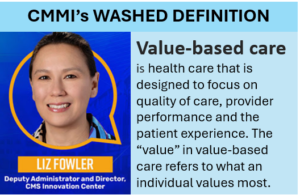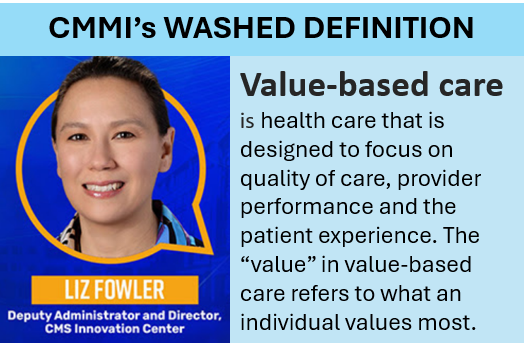Last week, Don Berwick, MD, announced his resignation as Administrator of the Centers for Medicare and Medicaid Services (CMS). Now is a good time to explain why Dr. Berwick is one of my all time health care heroes.

Apparently, I talk about Dr. Berwick a lot. A few years ago, I received one of my most treasured gifts from colleagues at Blue Cross Blue Shield of Michigan (BCBSM). It was a coffee mug featuring the famous photograph of the Four Horsemen of Notre Dame, a reference to my undergraduate alma mater. My colleagues replaced the faces of three of the horsemen with the faces of three of my health care heroes, Drs. Paul Ellwood (the person who coined the terms “health management organization” and “outcomes management”), David Eddy (the clearest thinker on the topics of clinical practice policies and the rational allocation of health care resources), and Don Berwick. The face of the forth horseman they replaced with my own face. I considered it a great honor to be associated with my heroes, at least on a coffee mug.
My team at BCBSM had heard me repeatedly explain Dr. Berwick’s important contribution to adapting the quality improvement principles that had been successfully used in manufacturing to the health care field. Others had been involved in promoting “continuous quality improvement,” “statistical process control,” and “total quality management” in health care. Paul Batalden, Brent James, Eugene Nelson, and Jack Billi come to mind, to name but a few. But, in my opinion, it has always been Berwick that has been the most eloquent and persuasive. He connected the statistical tools emphasized by James with the front line worker involvement emphasized by Batalden. And, he was able to describe how these approaches applied to clinical decision-making as well as care delivery.
At the heart of Dr. Berwick’s contribution was teaching us all to distinguish between the “Theory of Bad Apples” and the “Theory of Continuous Improvement.”
According to the Theory of Bad Apples, errors come from “shoddy work” by people with deficient work performance. Leaders who uphold this theory focus on inspection to identify such deficient performance, indicated by the undesirable tail in the distribution of provider performance as shown on the left side of the diagram above. Then, such leaders focus on holding the bad performers “accountable” by applying disciplinary measures intended to motivate improvement in performance and by pursuing other interventions intended to re-mediate the bad performance. In the health care context, the workers are physicians and the shoddy work is poor quality health care. According to Berwick, the predictable defensive response by the physicians who are targeted for such remedial attention includes three elements: (1) kill the messenger, (2) distort the data and (3) blame somebody else.
Berwick advocates instead for the Theory of Continuous Improvement. The basic principles of this theory are
- Systems Thinking: Think of work as a process or a system with inputs and outputs
- Continual Improvement: Assume that the effort to improve processes is never-ending
- Customer Focus: Focus on the outcomes that matter to customers
- Involve the Workforce: Respect the knowledge that front-line workers have, and assume workers are intrinsically motivated to do good work and serve the customers
- Learn from Data and Variation to understand the causes of good and bad outcomes
- Learn from Action: Conduct small-scale experiments using the “Plan-Do-Study-Act” (PDSA) approach to learn which process changes are improvements
- Key Role of Leaders: Create a culture that drives out fear, seeks truth, respects and inspires people, and continually strives for improvement

Berwick argued the point made by Dr. Deming: if we can reduce fear, people will not try to distort the data. When learning is guided by accurate information and sound rules of inference, when suppliers of service remain in dialog with those that depend upon them, and “when the hearts and talents of workers are enlisted in the pursuit of better ways, the potential for improvement in quality in nearly boundless.”
I first was influenced by Dr. Berwick back in the 1980’s when he championed these ideas during his tenure at the Harvard Community Health Plan, and subsequently during the 1990’s when he led the National Demonstration Project on Quality Improvement in Health Care and the Institute for Healthcare Improvement. His face was already on my coffee mug at the time he was nominated to lead CMS. I was thrilled that someone from our community of people dedicated to clinical process improvement had been recognized and would be serving in a position of such influence.
The Irony of the Political Opposition to Berwick’s Role as CMS Administrator
Dr. Berwick’s candidacy as CMS Administrator faced stiff opposition from Republican leaders who were angry about anything connected to the health care reform law or, for that matter, the Obama administration itself. The President made the decision to evade this opposition by making a recess appointment of Dr. Berwick. But, such recess appointments have a limited lifespan. As the deadline for making a formal, congressionally sanctioned appointment approached at the end of the 2011 legislative session, 42 Republican senators signed a letter reiterating their disapproval of Dr. Berwick as CMS Administrator. The arguments against Dr. Berwick’s candidacy, both at the time of his original nomination and again over the last few months, centered around comments that Dr. Berwick has made praising the British health care system. They concluded from his comments that he was in favor of redistributing wealth to the poor and of rationing, the dreaded “R” word, the thing done by “death panels!” He was, therefore both a bleeding heart and heartless at the same time. Dr. Berwick denied these charges, but the opposition was unconvinced and unwilling to back down from a position of persistent opposition to anything connected to “Obamacare.”
The irony is that, of the heroes on my coffee mug, Dr. Berwick is not the one deserving of praise for having insight and bravery concerning the basic tenets of health economics. Instead, it was Dr. David Eddy’s mug that was on my coffee mug because he was brave enough to publish numerous papers in the Journal of the American Medical Association explaining why rationing was the right thing to do (e.g. this one and another one). Eddy argued that creating evidence-based “practice policies” that rationally allocated health care resources using “explicit methods” was favorable to using implicit methods supported only by “global subjective judgement.” What a radical thought!
Despite my great admiration for Dr. Berwick, he was the hero that disappointed me as a rationing denier. In fact, in a 2009 paper published in Health Affairs entitled “What ‘Patient-Centered’ Should Mean: Confessions of an Extremist,” he eloquently argued that we should give any patient whatever they wanted, regardless of the cost and regardless of the evidence of effectiveness. He discounted the role of the physician as a steward of resources. I felt the argument was heartfelt and humanistic. But, I felt it was a cop out. How strange, then, that the Republican opposition hoisted him on the rationing petard.
Looking Forward to Berwick’s Next Journey
Although it is disappointing to me that Dr. Berwick will no longer be leading CMS, I am eager to see what he chooses to do next. I’m sure he will continue to make a great contribution to our field. Without all the administrative and political duties to clog up his day, perhaps we are about to witness a surge in his ongoing contributions to improving health care.
More information: See Health Affairs article and associated Health Affairs Blog Post praising Dr. Berwick.


















3 thoughts on “Health Care Heroes: Don Berwick, MD – Adapting industrial quality improvement principles to the improvement of health care processes”
Pingback: Time for change in education
Pingback: Conceptualizing “over-treatment” waste: Don’t deny health economics
Pingback: What should we do when there is a clash between two noble goals: consumer transparency and quality improvement? Five proposed principles. – Reward Health